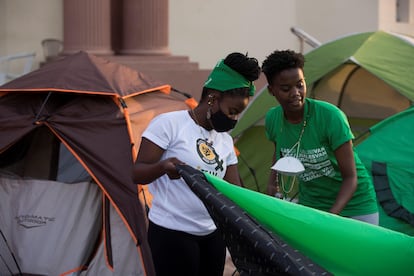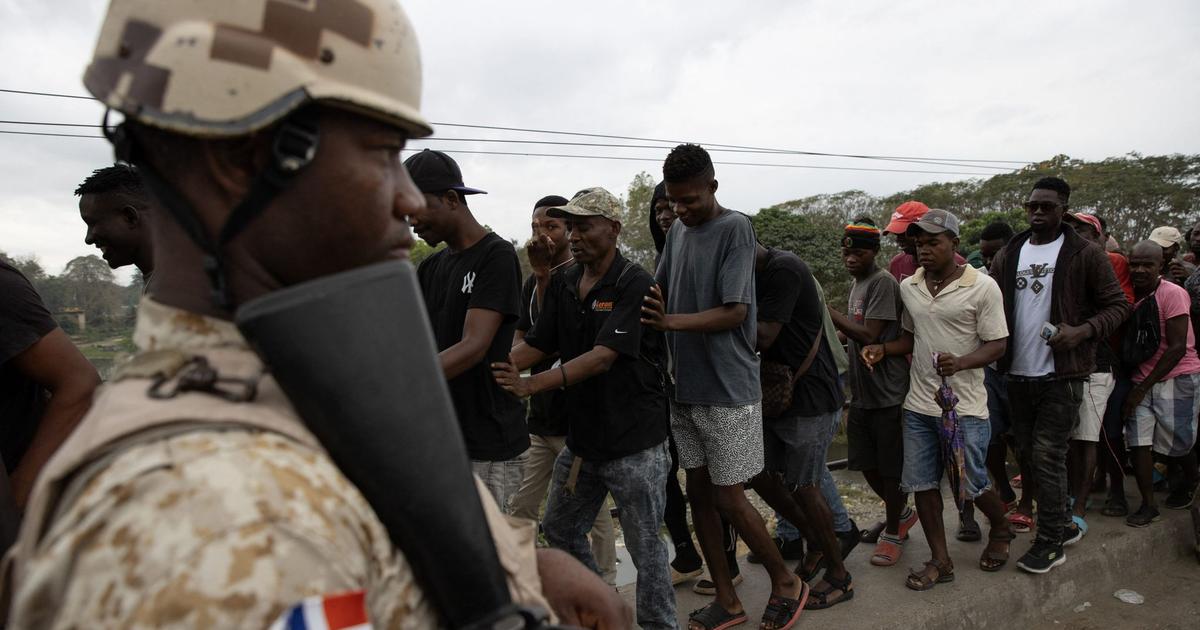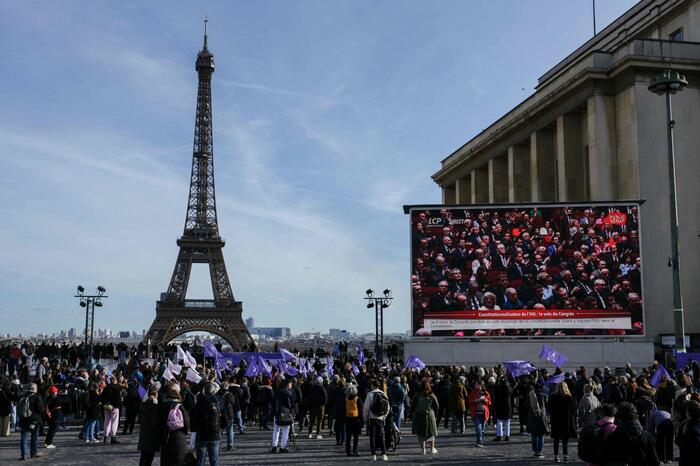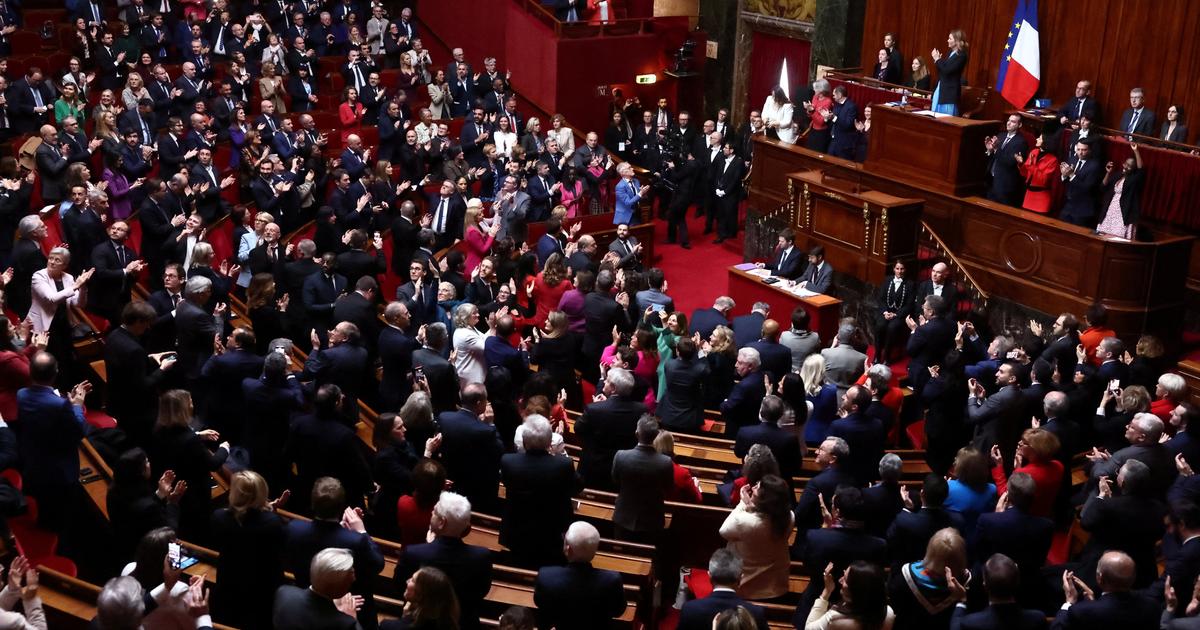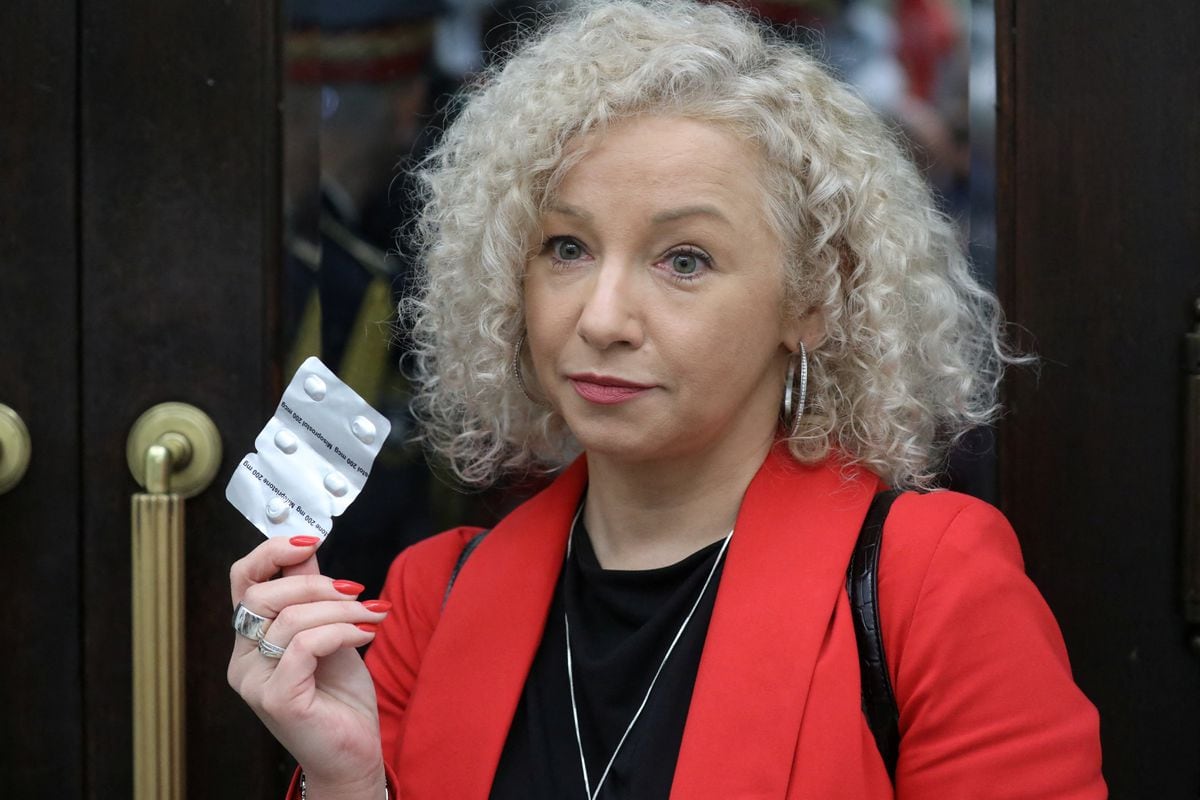Young activists set up a tent in the camp that feminist groups have set up in front of the National Palace in Santo Domingo.Orlando Barría / EFE
They have called it the camp of dignity or resistance.
Planted in front of the National Palace, in Santo Domingo, this camp has disrupted the political life of the Dominican Republic for three weeks, because its members demand that President Luis Abinader, recently moved to the Palace, promote what was one of his campaign promises : a new Penal Code in which the right to abortion is established when the life of the mother is at risk, in the event of rape or incest or due to malformations of the fetus.
In this Caribbean country of 11 million inhabitants, the 1884 Code is still in force, in which abortion is totally criminalized, which includes the Dominican Republic in the notorious list of six countries that maintain that total ban in the world.
Abinader, who has called himself a "modern social democrat" has proposed to give his country "a 'shock' of institutionalism and modernity" and Dominican women have taken him at his word.
One of the most visible faces of the camp is that of Sergia Galván, a veteran Dominican feminist with more than 20 years of struggle behind her for the rights of Dominican women, including abortion.
"We consider that this is the opportune moment, because there is a commitment from the president," says Galván in a telephone interview.
She explains that they have stood in front of the Palace because that building is the center of Dominican power, over which the president has great influence.
Abinader became president four months ago and his political movement, the Modern Revolutionary Party, controls the majority in Congress.
Galván hopes that the president will use that leadership to pressure his deputies to approve a new Penal Code that introduces the grounds that give Dominican women the right to abortion.
The feminist also knows that one thing is the campaign and its promises and another is the scenario that opens when the candidate sits in the presidential chair.
The Congress of the Dominican Republic has started the discussion of a new Penal Code, supposedly more modern, but in which abortion is still criminalized.
The discussion process leading to approval will be long and complicated, and the interests of important conservative power groups, including the Catholic Church and evangelical organizations, also weigh in on it.
The president has said that despite supporting the three causes demanded by Dominican women, he cannot impose them on the deputies, alleging the separation of powers in a democratic state.
"When the president wants a law that interests him to be passed, he uses his leadership to get it passed," says Galván.
"In this case [of abortion] the Executive is not exercising that leadership adequately," he claims.
“There is strong pressure from the ecclesial hierarchies, which calls into question the secular state.
The Dominican State must guarantee secularism in all its policies ”, explains the feminist.
The influence of the churches within Dominican politics collides with the changes that the Caribbean country has experienced.
The Dominican Republic has registered one of the highest economic growth rates in America and although 30% of its population still lives in poverty, the economic boom has allowed the formation of an important middle class, which demands more rights.
This is a generation that has accessed education, connected, informed and that aspires to live in a modern country.
“This middle class has been the architect of various social movements that have promoted a change in the country.
The expansion of social networks has become a new instrument of struggle and that means that the battle for the three causes of abortion has now more progress, ”explains Dominican sociologist Rosario Espinal, professor at Temple University, in Philadelphia.
Espinal describes the submission of the political class to the religious hierarchy as "cowardice" and the lack of commitment of his country's politicians to their own proposals as "shocking".
“This new government came to power with a platform for change, with the idea of change and modernity, which was supported by the urban middle class.
It is shocking that when they arrive with that narrative of change, they now want to get rid of the promise of supporting the three causes, ”he says.
To demonstrate the change that has been generated in Dominican society, Espinal resorts to surveys.
It shows the data from the 2019 Americas Barometer, which revealed that 61% of Dominicans agree with abortion when the mother's health is at risk and when it is established that the fetus is unviable due to malformations.
It is the politicians, he says, who do not live up to the aspirations of the society of his country.
“The Dominican Republic has an absolute criminalization of abortion.
This reflects the source incidence of the churches in the political power and the cowardice of the political class, incapable of legislating from the public function for which it has been elected ”, affirms the sociologist.
For Dominican women, the introduction of the three causes in the new Penal Code is a matter of life or death and of guarantees of their human rights.
In the Dominican Republic, maternal deaths increased by 20% last year, 25,000 cases of pregnancy complications linked to unsafe abortions were registered in public hospitals, and the country has one of the highest rates of adolescent pregnancy in the continent. .
In addition, 12% of Dominican girls have married or joined a partner before the age of 15.
Data from the Attorney General's Office for 2020 show that there were 5,227 sexual crimes that year, 1,028 were rapes and 1,710 sexual assaults.
National statistics reveal a terrible picture, because between 2010 and 2019 4,145 girls aged 12 and under were forced to give birth: 287 of them were nine years old.
The average age of the parents was 24 years old and 21% of them were over 30 years old.
However, 57% of those births do not record information about the father.
"Forcing a raped woman to continue with her pregnancy is an act of cruelty," says Sergia Galván.
“That abortion is not allowed is discriminatory and unfair and those who pay the highest cost of illegality are the poorest women.
They are penalizing poor women, ”she adds.
The women's claim has been echoed by young Dominican politicians such as Congressman José Horacio, 32, recently elected to a seat in Congress.
He is a spokesperson for Alianza País, a movement that has attracted young voters.
Horacio is part of the Parliamentary Justice Commission, which studied the proposal of the new Penal Code and managed to include in the final report issued by the commission the proposal to include one of the causes of abortion demanded by feminist movements: when life of the woman is at risk.
Horacio has gone further by presenting a dissident report before the camera, in which he recommends the plenary to add the other two causes in the new code: rape or incest or when "the fetus is unviable and has malformations incompatible with extrauterine life." .
This is the second important legislative battle of the young deputy: last year he managed to pass a law that he drafted in which child marriage is prohibited, legal in the Dominican Republic.
The law went into effect in January.
"I have a commitment to human rights," he says over the phone.
"If we pass a Penal Code that criminalizes abortion, we are penalizing human rights established in the Constitution," explains Horacio.
For the new code to be approved, a qualified majority of the 190 deputies that make up the Congress is needed, 92 of them from the ruling party.
"Approving a code without these grounds would mean that we are not capable of adopting modern legislation, we would be left behind, thus violating fundamental rights," says the politician.
Asked if he thinks his country can have legislation that gives women the right to abortion, Horacio responds: “It will be complicated, but it is a matter of time.
Sooner or later it will be law ”.
In the dignity camp its members organize Easter activities.
They are not willing to leave the camping and organizations like Catholics for the Right to Decide, a group of believers that promotes the rights of women, have come together to support them with actions such as Stations of the Cross.
Natalia Mármol and Ivanna Molina are young activists who are part of the Coalition for Women's Life and Rights.
They have been intense days for them, but they have taken them as a work that defends the achievements of the feminists who preceded them.
"Being here is the recognition of my full citizenship, of my rights," says Mármol.
"There is a lack of political will here that is costing us our lives," he adds.
For them and the women of their generation the struggle to decriminalize abortion in the hope of building a country that gives them security guarantees.
“This movement is not something of the moment.
This is also a demand for a modern democracy ”, affirms Molina.
"We know that at the end of the day social changes are not immediate, but this camp is an example that they can be achieved," he adds.
Both women say they are willing to exhaust all available resources to achieve the decriminalization of abortion in their country.
"We are going to achieve this in any way," says Molina.

